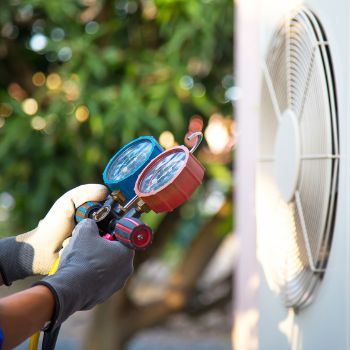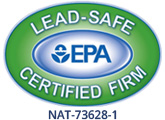How Air Conditioning Refrigerant Leaks Occur
 Also known as Freon or coolant, refrigerant is a chemical compound that circulates through your air conditioning system. In the process, it draws in indoor heat and moves it outdoors, transforming from a fluid to a gas during this loop. A lack of refrigerant means your air conditioner cannot do its job to cool your home or commercial space and maintain the desired temperature.
Also known as Freon or coolant, refrigerant is a chemical compound that circulates through your air conditioning system. In the process, it draws in indoor heat and moves it outdoors, transforming from a fluid to a gas during this loop. A lack of refrigerant means your air conditioner cannot do its job to cool your home or commercial space and maintain the desired temperature.
Damage to various air conditioning components can cause refrigerant to leak out. This development not only means your space feels less cool or temperature controlled, but also poses a health and environmental hazard. Here’s what you should know about air conditioner refrigerant leaks.
How Does a Leak Happen?
Air conditioners experience wear and tear like any other appliance, especially if you routinely put off maintenance. Leaks can result from:
- Weakened or damaged seals around joints and connections, including valves and fittings.
- Pinhole leaks from debris and volatile organic compounds (VOCs) accumulating on the condenser coils. In response, formic acid can build up and eat away at the copper, causing small leaks to form. This gradual development may also occur due to formaldehyde in the indoor air – a process known as formicary corrosion.
- Excessive vibrations from a poorly sealed compressor, damaging the refrigerant lines and copper coils.
- Exposure to weather, lawnmowers, people and animals, causing debris to build up in the outdoor portion of your air conditioner.
Signs of an Air Conditioner Refrigerant Leak
Multiple signs point to a refrigerant leak somewhere inside your air conditioning system:
- The unit no longer cools your home as effectively but at the same time, your energy bills are higher. This indicates that your system doesn’t have enough refrigerant to fully regulate warm indoor air.
- You don’t feel cool air coming from the vents. Instead, it feels moderately warm or the air has a restricted flow. The interior space may also feel humid, even after you’ve run the AC for a while.
- Cooling cycles appear to last longer – a sign that the A/C unit or HVAC system is working harder to cool your space.
- Condensation freezes on the evaporator coil, indicating the air conditioner can’t absorb enough heat to perform well.
- You spot water dripping from the unit, a sign frozen condensation on the evaporator coil has started to melt.
- You notice a bubbling, gurgling or hissing sound – a sign coolant is leaking through a hole in a coil.
- You notice a sweet scent near the air conditioning unit.
Where Refrigerant Leaks May Occur
Refrigerant leaks occur around three areas of your air conditioning unit: The evaporator coils, refrigerant lines and condenser coils.
- Vibrations are more likely to affect the evaporator coils, which can rub against each other or other A/C components until leaks form.
- Made from copper, condenser coils are susceptible to formic acid accumulation. The material can also vibrate against nearby metal tubes to develop cracks and leaks over time.
- Refrigerant lines are susceptible to two risks: Decaying joints or damage from outside factors, including animals and lawn equipment.
Why Refrigerant Leaks are Hazardous
Beyond inefficient performance and higher energy bills, leaking refrigerant poses a danger to your health and the environment. Refrigerants frequently contain hydrofluorocarbons (HFCs) and hydrochlorofluorocarbons (HCFCs) – two extremely strong greenhouse gas substances that can potentially poison health upon exposure. Due to these risks:
- Never attempt to fix a refrigerant leak or refill the compound on your own.
- Have a professional help you responsibly dispose of your air conditioning system at the end of its life to reduce greenhouse gas emissions and environmental contamination.
- If you suspect your air conditioner has a leak, look for signs of refrigerant poisoning, including nausea, dizziness, headaches, coughing, vomiting, or irritation of the eyes, throat or ears.
Don’t put the health of your family or community at risk! Schedule an appointment with MJ Fahy & Sons to have our HVAC technicians inspect and repair your residential air conditioning or commercial A/C unit.




